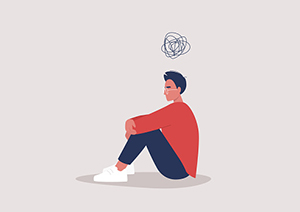In a Canadian population-based cohort study reported in the Journal of Clinical Oncology, Raphael et al found that survivors of testicular cancer were more likely to use mental health services in both the short and long term following treatment compared with the general population.
Study Details
The case control study included 2,619 patients with testicular cancer who underwent orchiectomy in Ontario between 2000 and 2010. Cases were matched (1:5) for age and geographic location with 13,095 controls who did not have a history of testicular cancer or diagnosis of any cancer before the end of study follow-up. Population-level databases were used to identify mental health service use episodes, with outpatient use including visits to a general practitioner for a mental health concern or any visit to a psychiatrist. Mental health service use was compared in the pretreatment (2 years prior until 1 month before orchiectomy), peritreatment (1 month before until 1 month after orchiectomy), and posttreatment periods (1 month after orchiectomy until end of follow-up). Rate ratios (RRs) were adjusted for baseline mental health service use.

Photo credit: Getty
Key Findings
Median follow-up was 12 years (interquartile range = 0–15 years) among both cases and controls.
During the pretreatment period, 20% of cases vs 18% of controls had one or more outpatient visit. Rates of outpatient visits per 1,000 person-years were 528 vs 528 (RR = 1.01, 95% CI = 0.81–1.26).
During the peritreatment period, 12% of cases vs 4% of controls had one or more outpatient visit. Rates per 1,000 person-years were 1,162 vs 533 (RR = 2.18, 95% CI = 1.81–2.63).
During the posttreatment period, 57% of cases vs 47% of controls had one or more outpatient visit. Rates per 1,000 person-years were 731 vs 588 (RR = 1.25, 95% CI = 1.07–1.46), with the difference between groups persisting over the median follow-up of 12 years and appearing to increase with increased follow-up duration.
In adjusted models, patients who received additional early treatment (including adjuvant chemotherapy, radiation, or retroperitoneal lymph node dissection) had significantly higher risk for mental health service use in the post-treatment period (RR = 1.34, 95% CI = 1.14–1.68). Baseline mental health service use among patients was the factor most strongly associated with post-treatment use (RR = 5.64, 95% CI = 4.64–6.85).
The investigators concluded, “Testicular cancer survivors use mental health services more often than healthy controls. Survivorship care plans that address the long-term mental health-care needs of this population are needed.”
Christopher Booth, MD, of the Division of Cancer Care and Epidemiology, Queen’s University Cancer Research Institute, Kingston, Ontario, is the corresponding author for the Journal of Clinical Oncology article.
Disclosure: The study was supported by ICES, which was funded by an annual grant from the Ontario Ministry of Health and Long-Term Care. For full disclosures of the study authors, visit ascopubs.org.

